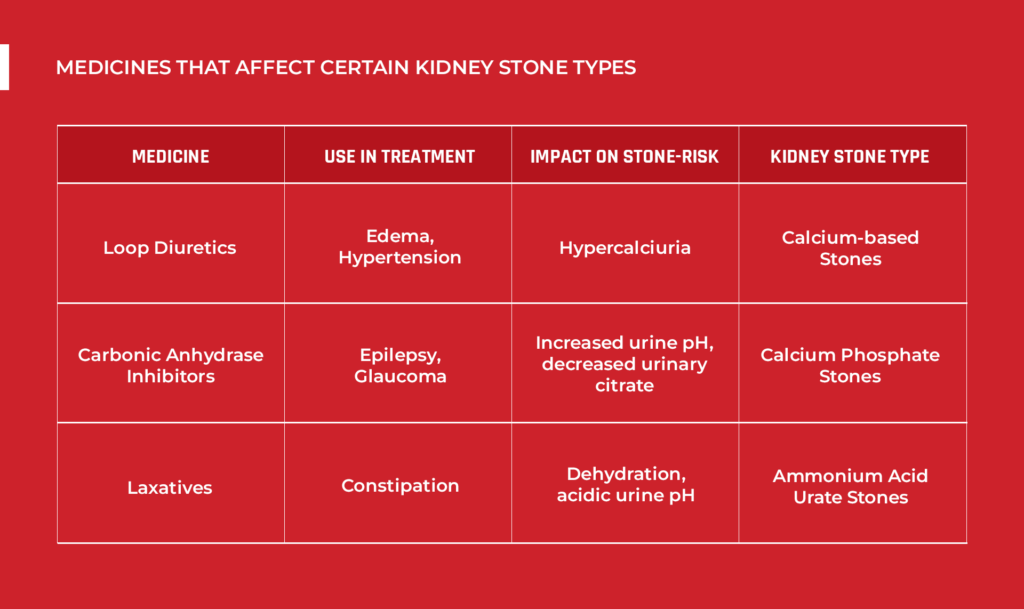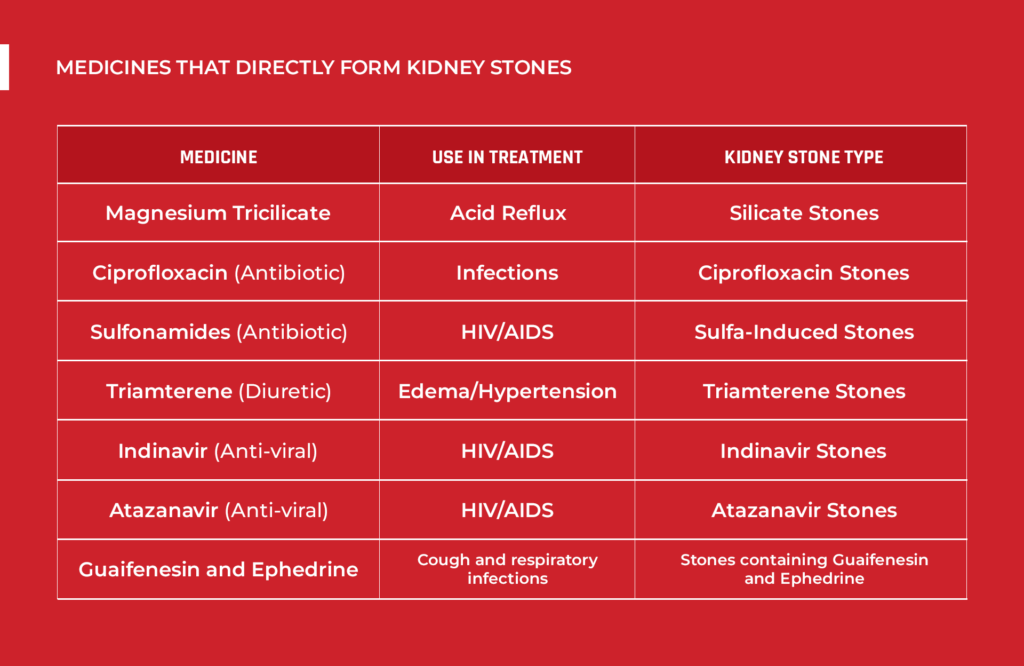Published: July 14, 2024 | 7 mins read
Medicines That Can Cause Kidney Stones
ARTICLE SHORTCUTS
Imagine popping a pill and ending up with a kidney stone! You read that right. There are kidney-stone-causing medicines out there that can turn your kidneys upside down.
Statistics say that these medicines impact around 1-2% of all kidney stone cases. While this does not sound much of a concern, research shows some mind-blowing facts about it.
You must be thinking, “What? Some meds can do that?” Yup, the following section will give you more background about kidney-stone-causing medicines.
Background
When it comes to drugs, not all play fair. Some take the sneaky route and give you kidney stones. You can split these troublemakers into two groups.
First, we have the pranksters. These drugs mess with your urine pH, calcium, phosphate, oxalate, citrate, or uric acid in your urine. So, they contribute to the formation of other stone types.
Second, we have the magicians. These medicines don’t dissolve in the urine. They transform into stones themselves!
In the next section, we will discuss prankster medicines—those that throw a chaotic party with other stone-forming elements in your urine.
Medicines That Increase The Risk Of Certain Kidney Stone Types
As mentioned, there are certain medications that can increase stone risk. Here’s a list:
Loop diuretics
Loop diuretics (e.g., bumetanide and furosemide) are medications primarily used to treat edema (fluid retention) or high blood pressure.
Imagine opening the faucet to let a large amount of water flow out. In the same way, loop diuretics work by causing the kidneys to excrete more sodium and water. Also, they prevent the reabsorption of sodium and calcium in the kidney. This leads to increased urinary calcium, also known as hypercalciuria.
Nevertheless, excess calcium alone won’t cause stones without the presence of oxalates or phosphate in the urine.
Carbonic Anhydrase Inhibitors
These medicines treat diseases like epilepsy or glaucoma (fluid buildup in the eye). Carbonic anhydrase inhibitors (e.g., acetazolamide), work in the kidneys’ proximal tubule (first functional segment) to block sodium bicarbonate reabsorption. Over time, this can increase urine pH and decrease urinary citrate. When this happens, calcium phosphate kidney stones may form.
Laxatives
Laxative abuse causes persistent diarrhea, leading to dehydration and acidic urine pH. These two promote ammonium acid urate stone formation.
Research shows that stopping laxative use can correct these urinary issues. For example, in one case, a 12-mm stone disappeared after 18 months of increased fluid intake and stopping laxatives. So, laxative abuse should be suspected in patients with ammonium acid urate stones, especially if they don’t have bowel disease or urinary tract infections.
Now that we’ve explored the common medicines that impact the formation of certain kidney stone types, let’s discuss those that directly form stones.

Medicines That Directly Crystallize And Cause Kidney Stones
Now, let’s explore the medicines (a.k.a. magicians) that directly crystallize in your urine. Here is a list:
Magnesium Trisilicate
Magnesium trisilicate (composed of magnesium, silicon, and oxygen) is used to ease acid reflux symptoms. Excessive magnesium trisilicate use can lead to silicate kidney stones.
The typical urine silica level ranges between 1.31 mg/dL and 1.46 mg/dL. Amounts that go beyond this ballpark can pose a problem. Research says that higher levels can be linked to taking medications or consuming foods rich in silica, like vegetables and whole grains. So, this is another reason to shift towards an animal-based diet.
Ciprofloxacin
Back in the day, travelers took ciprofloxacin to prevent diarrhea caused by contaminated water. Ciprofloxacin is an antibiotic often used to treat various simple and complex infections. Interestingly, it forms crystals in alkaline urine with a pH greater than 7.3, especially after taking doses higher than 1000 mg.
Sulfa Medications
Sulfonamides are antibiotics usually used for conditions like HIV/AIDS. These drugs don’t dissolve in the urine and can cause kidney stones.
Triamterene
Triamterene is a diuretic that helps remove excess water and sodium from the body.
While it’s unclear how triamterene leads to kidney stones, some theories suggest that it creates a framework for stones to form. About 21% of triamterene stones are purely made of triamterene, while others are mixed.
Indinavir and Atazanavir
These drugs are anti-viral medicines often used to treat HIV/AIDS. They can cause kidney stones in some patients.
Guaifenesin and Ephedrine
Certain over-the-counter medications containing guaifenesin and ephedrine can also lead to kidney stones. These two are commonly used to treat coughs or any respiratory tract infections.To those of you who are currently taking any of these drugs, how do you know if you are forming medicine-induced kidney stones? The following section will tell you how.

How To Analyze Medicine-Induced Kidney Stones
To know whether your kidney stone is due to some drugs, you must bring it to the lab for analysis. (It’s like going on a first date in your “getting to know each other” phase.) Analyzing stones utilizes techniques like infrared spectroscopy or X-ray diffraction to detect drugs or their byproducts within the stones. We have a separate blog covering everything about stone analysis that you can access here.
Certain medications can also trigger intense crystal formation inside the kidney tubules (tiny tube-like structures), leading to sudden kidney failure. Thus, identifying crystals in the urine or kidney tissue through tests like renal biopsy is vital for accurate diagnosis.
After you confirm that your kidney stone is due to some drugs, is there a way for you to prevent future formations?
Can You Avoid Taking Kidney-Stone-Causing Medicines?
The answer to the question is: it depends.
Preventing medicine-induced kidney stones involves several key strategies.
First, it’s essential to address the underlying cause of stone formation. This may require consulting with a naturopathic doctor who can provide holistic insights, unlike your run-of-the-mill medical doctors in the West.
Additionally, understanding specific risk factors unique to each stone type is critical. This knowledge can guide the prevention of stone types affected by drugs like calcium oxalate, calcium phosphate, and uric acid stones.
Proper hydration is another essential aspect of prevention. Increasing fluid intake helps produce more urine to flush out stone-forming elements in the urine. For practical hydration tips, read our blog here.Boosting the immune system is also beneficial to fight infections. An animal-based diet is the best way to achieve robust immunity. This dietary approach can enhance overall health to avoid diseases that might require you to take kidney-stone-causing medicines.
Lastly, our Coaching Program is an excellent place for you to formulate the right kidney stone prevention strategy. As we all know, everyone has specific health battles that affect how stone risk factors manifest. If you can develop a personalized Prevention Plan for your unique needs, wouldn’t it be worth it? So, don’t hesitate to join our Coaching Program today and see how it will change your life forever.

Comments or questions?
Responses
WHAT TO READ NEXT
Publish Date: August 11, 2024
Magnesium Benefits for Kidney Stone-Formers
Publish Date: April 7, 2024
Metabolic Syndrome and Insulin Resistance Impact on Kidney Stones
Publish Date: March 24, 2024
Can High Uric Acid Levels Cause Kidney Stones?